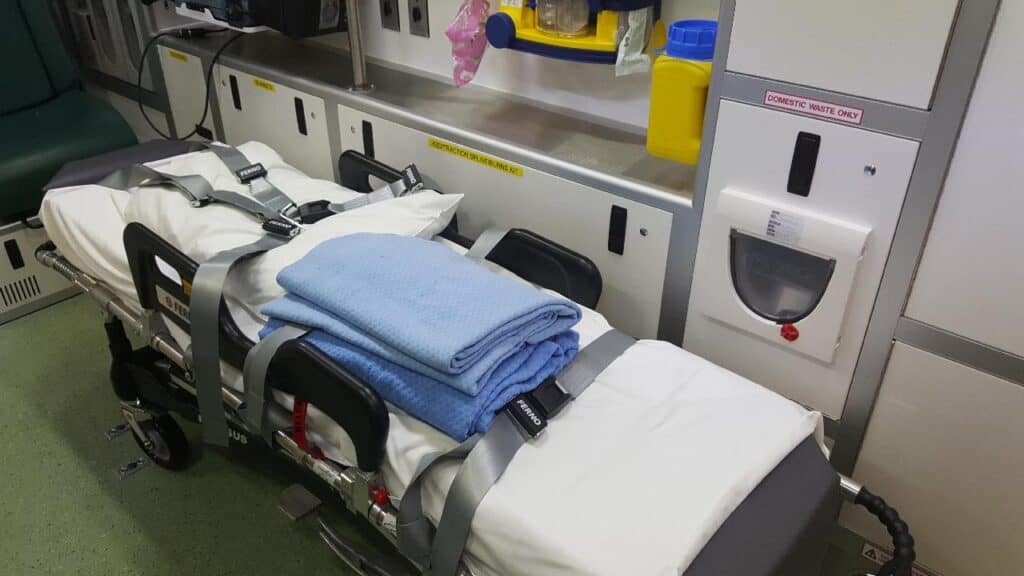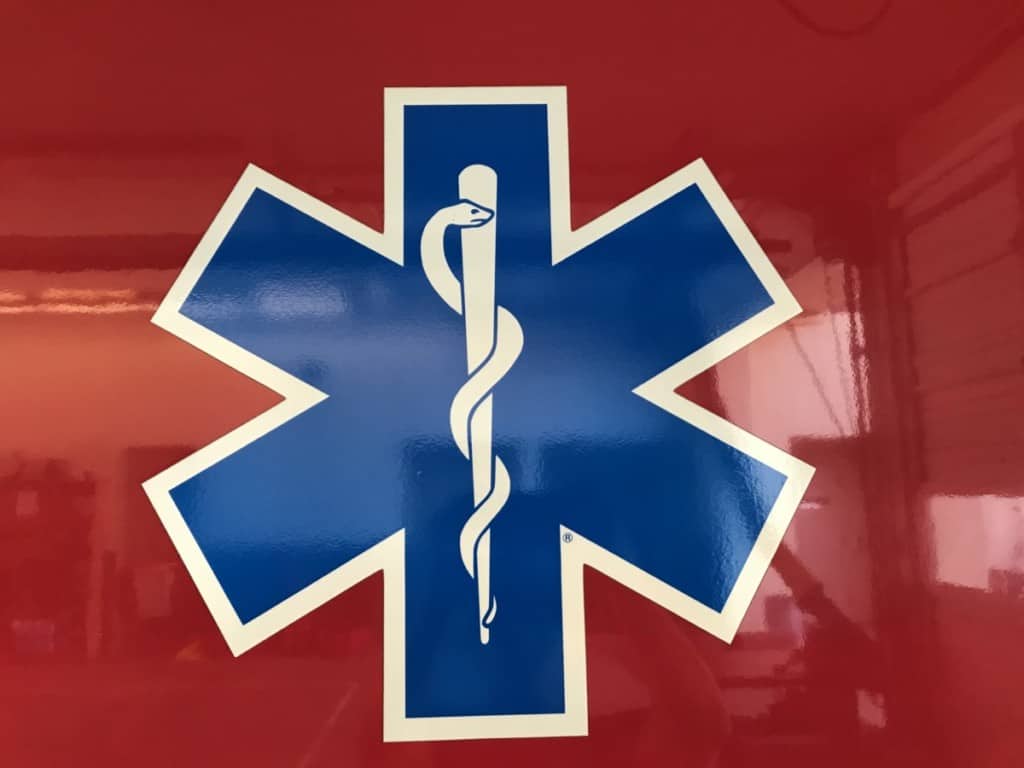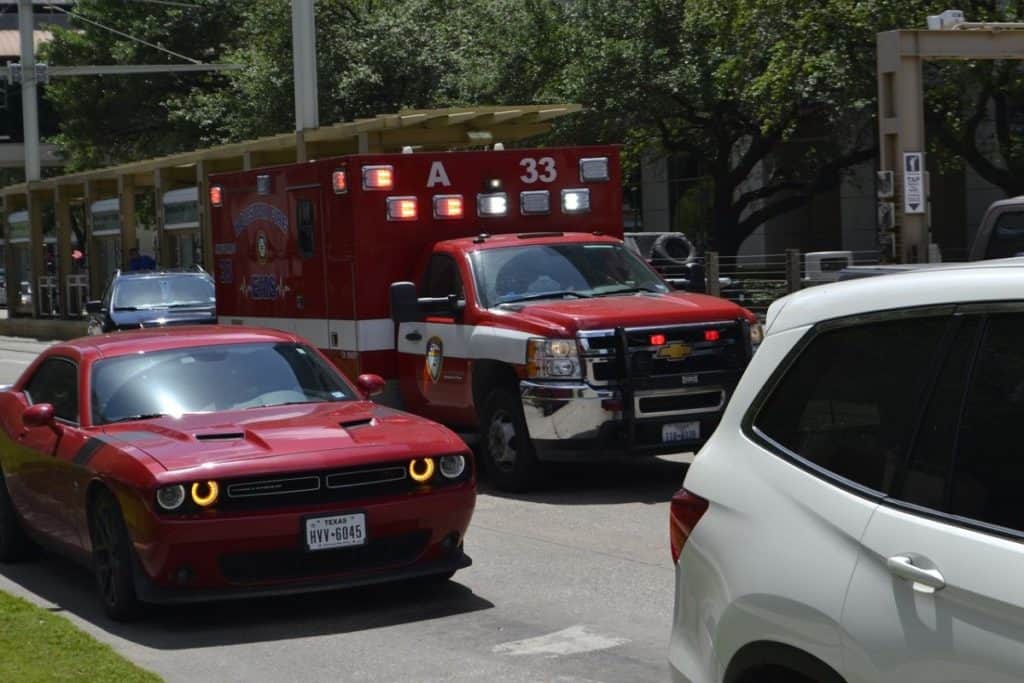There are a variety of medical professionals that help the sick and injured in different settings. EMTs and Paramedics are one such type that specializes in emergency medicine, generally in the pre-hospital setting. Some people wonder if they are actually medical doctors (physicians) and what they are actually able to do in a medical setting?
EMTs and Paramedics are emergency medical professionals, but they are not a type of medical doctor. They receive much less training and education and are always working under the direction of a physician. However, they are still very important and may be more useful than most doctors in a pre-hospital setting.
Doctors and EMTs are needed in healthcare and they serve different purposes and roles. Let’s take a closer look at these professions and see what makes them so different, even if they do some of the same things.
Your # 1 priority is keeping your family safe. As a firefighter, I recommend everyone has updated smoke detectors that don’t require battery changes, like these ones from Kidde, a fire extinguisher, like this one from Amerex, and a fire escape ladder if you have bedrooms above the first floor, I recommend this one from Hausse.
Also read: Is EMT a Good Job/Career? Is it Right For You?
EMTs vs. Doctors
Healthcare is a huge industry. In the US, private healthcare accounts for over 11% of all jobs.
Within this system, there are a wide variety of different positions to fulfill the different medical needs of their patients. One position that specializes in emergency medicine is the EMT or Emergency Medical Technician.
People often see these EMTs show up at someone’s house for a medical emergency and wonder if they are actually doctors? I have been asked that question quite a few times on-scene, and the truth is no.
EMTs are not doctors, not even close. But that doesn’t mean that they are not important.
Let’s take a look at each.
Emergency Medical Technicians (EMT)

Emergency Medical Technicians are a vital part of the pre-hospital, 9-1-1, Emergency Medical System (EMS).
EMTs typically work on ambulances and Fire department apparatus (engines, trucks, rescues, squads) responding to emergency calls for medical service. They may work alongside Paramedics and other healthcare professionals. Sometimes EMTs can work in the hospital as well.
EMTs go through 110 to 180 hours of classroom, lab, and manipulative skills training over about 6 months. After completing the program, they have to pass both a written (or computer-based) test, as well as skills-scenario testing to be certified by the NREMT (National Registry of Emergency Medical Technicians) and their state’s EMS agency.
They are trained to perform Basic Life Support (BLS) in emergency settings. As a general rule, they can not perform invasive procedures (anything that breaks the skin, like IV needles) though this can vary by state.
They are also not authorized to diagnose medical conditions. They will treat symptoms in emergencies based on what they believe the cause to be.
EMTs can:
- Perform emergency medical assessments
- Place BLS airway adjuncts like oropharyngeal (OPA) and nasopharyngeal (NPA) airways
- Perform ventilation using a bag-valve-mask (BVM)
- Perform Cardio-Pulmonary Resuscitation (CPR)
- Use Automated External Defibrillators (AED) (to shock irregular heart rhythms in cardiac arrest)
- Suctioning debris from the airway
- Pulse oximetry (oxygen in the blood)
- Splinting injuries (like spinal immobilization and even traction splints)
- Glucose (blood sugar) testing
- Administer oxygen, oral glucose, and sometimes activated charcoal or Narcan (naloxone)
In addition, EMTs can assist patients with certain prescribed medications, including:
- Nitroglycerin
- Inhaled medications like albuterol
- Epinephrine injectors (EpiPen)
As we can see, EMTs can perform quite a few different medical interventions, without the direct supervision of a doctor, that can save life and limb. However, there are very specific criteria in regards to what they are trained for and allowed to do, in a medical capacity.
EMTs are taught the basics that are needed for emergency scenarios (called BLS) so that they can focus on the interventions that can save lives outside the hospital setting.
Here is some more info about being an EMT:
Medical Doctors (MD)
Doctors are a higher level of medical care than EMTs.
Medical doctors are able to actually diagnose (determining the cause or disease responsible for medical symptoms) and treat these conditions. They have a much larger toolbox when it comes to testing and treating conditions, whether in an emergency or not.
In order to become a doctor, the education is extensive and takes much longer than becoming an EMT.
Doctors usually go through 4 years to get a Bachelor’s Degree, then 4 years of medical school, followed by 3 to 8 years of graduate medical education (GME) (Internship/residency programs. That’s 11 to 16 years of education! And sometimes more for certain specialties.
During their schooling, they will learn, in-depth about:
- Anatomy and Physiology (how the body works)
- Pathophysiology (how diseases affect the body)
- Pharmacology (how medications affect the body)
- Immunology (how the body protects itself)
- Infectious diseases
- Surgical procedures
- Genetics (how genes and DNA affect the function of the body and diseases)
- Nutrition (how food affects the body)
EMTs learn a little bit about some of these topics, but very little compared to that of an MD.
This video goes into what doctors do and how to become one:
Doctors usually specialize in a particular area of medicine and that is where their expertise lies.
So, an emergency department physician will usually have the best training, tools, and capabilities to treat someone in an emergency (even more so than an EMT).
However, an MD that specializes in Oncology (cancer), Pulmonology (the lungs), or Ophthalmology (eyes) may not be the best healthcare provider to treat emergent conditions (obviously depending on the type of emergency).
In a true emergency, EMTs can be better equipped and trained to save someone’s life.
Occasionally on 9-1-1 calls, a doctor will happen to be there and insist that they know what is best for the patient who called for help. Unless they are an ER doc, that is usually not the case.
The emergency personnel on the fire trucks and ambulances (EMTs, paramedics, firefighters, etc.) are really the experts when it comes to emergency medicine outside of the hospital.
Physicians and EMTs serve different roles, but they are both very important in the medical system. Even though they have very different levels of education, they both can be the best provider to help in their area of specialty.
I have heard that doctors will actually respond to emergency calls for medical assistance outside the hospital in some countries. In the US, at least in my experience, this is not the case.
I believe this may be where these questions originated. If someone moves to the US from another country and is used to physicians coming to their house when they call an emergency number, they may assume that is the case everywhere.
But in the United States, and many other countries, you will get EMTs, paramedics, firefighters, and police officers (no doctors) when you call 9-1-1.
What About Paramedics?
A Paramedic is actually a type of EMT. Think of paramedics as advanced EMTs. They have more schooling and training and are able to perform a wider variety of medical treatments and assessments.
To become a paramedic, you first have to become an EMT-Basic (also known as just EMT).
Paramedic education adds to what was learned in EMT school and sometimes you are required to work as EMT to gain experience, before being admitted to a paramedic program.
These programs usually require 1090 to 1330 hours (or more) of instruction and typically take 12 to 18 months to complete. They will sometimes even get a college degree in Paramedicine.
| Paramedic Education | Hours Required |
|---|---|
| Didactic (classroom) | 450 hours minimum |
| Clinical (hospital) | 160 hours minimum |
| Internship (ambulance) | 480 to 720 hours |
Paramedics can obviously do all the same things that an EMT can do, but they can also:
- Use and interpret cardiac monitors (including shocking irregular heart rhythms)
- Start intravenous (IV needles) and intraosseous (IO) lines
- Administer fluids
- Give medications by IV, injection (shot), mouth, or IO (needle directly into the bone)
- Use advanced airway tools (intubation, laryngoscopes, etc.)
And sometimes more, depending on what is allowed in the area by the medical directing physician.
Compared to an EMT certification, paramedics are actually licensed. They have a lot more on-the-job training, as well as a longer total education program.
This is because they are allowed to do these more invasive procedures than an EMT and because they are typically the highest medical authority on the scene at an emergency 9-1-1 call. (unless an MD happens to be there).
Do You Have to Go to Medical School to Be an EMT?
To become an EMT, you do not have to go to medical school, as we talked about above. An EMT program usually only takes about 6 months to go through, whereas medical school is 4+ years.
This is actually a great way to get some experience in healthcare. You can get an EMT certification relatively quickly and start working. This can help to decide what career path you should take.
Maybe you decide that you like the medical field, but the emergency setting is too stressful or you want to work in a more long-term care type of setting. This experience can be invaluable for getting you on the best path, without wasting years to get into a career field that you don’t enjoy.
Or maybe you love the emergency setting and want to become a firefighter or a paramedic.
Even if you are thinking about becoming a doctor, EMT can be a great first step.
Can an EMT Become a Doctor?

You can always become a doctor later, after working as an EMT. Or maybe you can even work on an ambulance while you are going to college or medical school.
In order to do so, you will still have to go through all the same schooling (no shortcuts for being an EMT).
However, your emergency experience, as well as, patient assessment skills can be extremely helpful for you as you transition into other medical fields. This will give you a big leg up on some of your classmates in medical school who don’t have this real-world experience.
One of the most difficult (and most important) things for most people starting in any healthcare profession is your bedside manner. This is essentially just talking to your patient and treating them like a real person.
This sounds simple, but most people struggle to talk to their patients in a way that makes them feel heard and that they are in good hands, while also getting all the info that is needed to find out what is going on and how best to treat them.
These assessment skills you can learn as an EMT can ensure you become an amazing doctor (or any other medical professional) later in your career path.
Can They Ever Work in a Hospital?
Most EMT jobs are pre-hospital positions on ambulances and fire engines, however, they can sometimes work in hospitals as well.
The most common hospital-based job for EMTs is called an ER tech.
An ER (emergency room) technician works alongside doctors and nurses in the ER to help care for people using the skills they learned in EMT school. This is a different role when compared to an EMT outside the hospital.
You will work under more direct supervision and in an (obviously) more controlled environment. You still get to help manage more emergent types of medical and traumatic conditions but in a very different setting.
ER techs may be trained and allowed to perform some tasks that regular EMTs are not, like drawing blood and collecting other lab samples for testing. These may require extra training or certifications.
This can be a good position for someone that is looking into becoming a nurse (RN) or doctor later on, as it gives you a better look at working inside a hospital, compared to most EMT jobs.
Related Articles
How to Become an EMT: Expert Guide
Can You Live Off an EMT or Paramedic Salary? $$$

